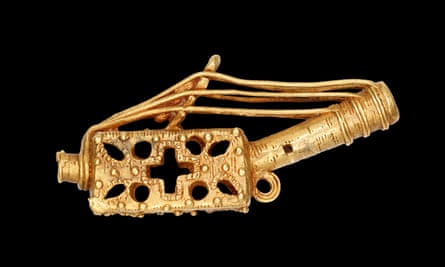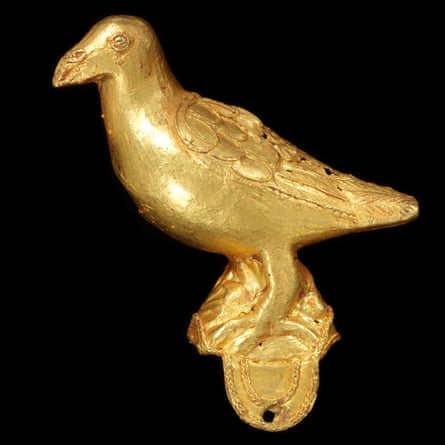
British Museum and V&A to lend Ghana looted gold and silver
Objects to go on show at the Manhyia Palace Museum in Kumasi as part of Asante king’s silver jubilee celebrations
Gold and silver treasure looted from west Africa by the British army in colonial wars are to be lent to Ghana in a three-year deal, the British Museum and the Victoria and Albert Museum have announced.
The precious regalia, which had belonged to the Asante royal court, is regarded as part of the “national soul” of Ghana. Under the deal, 17 objects from the V&A and 15 from the British Museum, will go on show later this year at the Manhyia Palace Museum in Kumasi, the capital of Asante region. Many of the items have not been seen in Ghana for 150 years.
News of the deal came as Greece renewed its call for the Parthenon marbles to be returned to Athens.
Most of the objects involved in the Ghana deal with Otumfuo Osei Tutu II, the current Asante king, were looted from Kumasi during Anglo-Asante wars in the 19th century. Some formed part of an indemnity payment forcibly extracted from the asantehene (king) at the time. But they also include a gold lute-harp that was presented to the British diplomat Thomas Bowdich during a trade treaty in 1817.

Nana Oforiatta Ayim, a special adviser to Ghana’s culture minister, welcomed the deal as a “good starting point” in righting the wrongs of the UK’s violent colonial past.
Speaking to the BBC, which first reported the deal, she said: “They’re not just objects, they have spiritual importance as well. They are part of the soul of the nation. It’s pieces of ourselves returning.”
Ayim described the deal as a “sign of some kind of healing and commemoration for the violence that happened”.
Tristram Hunt, director of the V&A, said the items were the equivalent of “our crown jewels”.

He said: “One hundred and fifty years after the attack on Kumasi and looting of court regalia, the V&A is proud to be partnering with the Manhyia Palace Museum to display this important collection of Asante gold work. As part of our commitment to sharing collections with a colonial past, we are excited to see these items on public show, in Ghana, as part of Asantehene Otumfuo Osei Tutu II’s silver jubilee celebrations.”
Major museums in the UK, including the British Museum and V&A, are prevented by legislation from permanently handing back contested treasures in their collections. These include: the Parthenon sculptures, which Greece has long campaigned to return to Athens; the Benin bronzes, which are the subject of a similar demand by Nigeria; and the Asante gold.
Hunt said the three-year deal with the king, which could be extended, was “not restitution by the back door”.
He added: “We have a responsibility to the countries of origin to think about how we can share those more fairly today. It doesn’t seem to me that all of our museums will fall down if we build up these kind of partnerships and exchanges.”
On Thursday, Greece’s prime minister, Kyriakos Mitsotakis, repeated calls for the return of the Parthenon marbles after a diplomatic spat with UK government last year.
In his first public statement on the issue since November, Mitsotakis said Greece had been in talks with George Osborne, chair of the British Museum, about a deal to bring them to the Acropolis Museum.
He said: “Let me be clear, we will insist on their reunification for many reasons. But one, in my mind, is the most important: Only by being seen together, in situ, in the shadow of the Acropolis, can we truly appreciate their immense cultural importance.”

